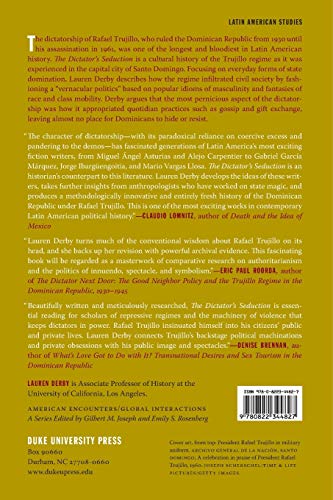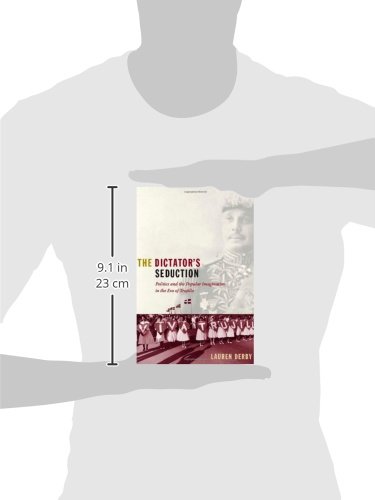



The Dictator's Seduction: Politics and the Popular Imagination in the Era of Trujillo (American Encounters/Global Interactions)
C**M
Worth the Considerable Effort
Well, we can’t say she doesn’t warn us. At the very beginning of the ‘Acknowledgments’ section, Lauren Derby tells us “this book commenced as a dissertation,” and so it reads. On top of the 84 pages of notes, the reader is faced with a 40-page bibliography, around 15 writers to the page, all of whom seem to get one or more named citations in a text that clocks in at only 266 pages. Moreover, Ms. Derby never seems to use a 50-cent word when a five-dollar word will do, and she regularly employs Spanish (and on occasion Latin), sometimes with translation and sometimes without, when English would have served the purpose just as well or better. In the early stages I worried, given the Lenin-esque style and citation of the Castros’ man at Harvard, Jorge Dominguez, that I was in for an unhappy, Socialist ride. Thankfully, I was wrong.Ms. Derby captures with great insight many key themes of Trujillo’s rule: his leadership in rebuilding the devastated capital city after the San Zenón hurricane; his government’s profound transformation of the country’s economy; his ability to manipulate public discourse for his own self-aggrandizement and to undermine potential political competitors; and his use of public spectacle to capture internal and international attention. When she turns her attention to vodú as it exists in the Dominican Republic, for a while it is hard to see where she is headed; the chapter on ‘Trujillo’s Two Bodies’ doesn’t really focus on him, and she strains to pull Trujillo back into the discussion at the end of it. Finally, though, one is obliged to accept the topic as relevant, in part because anyone governing the Dominican Republic in that era would have had to deal with a fairly widespread belief in the occult.Then there are the other themes Ms. Derby describes so well: tigueraje, a kind of brazen social climbing, and the function of gifts as a means of placing others in one’s debt. These concepts did not originate with Trujillo and they did disappear with his demise; indeed, a Dominican friend is likely to tell a newly arriving Spanish speaker (as the second most important piece of local vocabulary to know, after the word for plastic bag) what it means to be a tíguere – or tíguera, the modern female version – and what to do when you spot one, or he or she spots you. Tigueraje and the use of gifts to create debt are not universal traits, of course, but their appearance is common enough to make understanding them useful even today.Besides the ponderous prose, there are a couple of other weak links in the book. One is Ms. Derby’s fixation with trying to define Dominican “manliness” through the ages. Another is her description of the survivors’ reaction to San Zenón. Here, on the one hand, she assigns to squatters an artificial set of motives to try to make an academic point, rather than accepting that hunger and exposure would have provided plenty of motivation for their behavior. On the other, she assigns to the old elite “a class loathing that would accept only the most extreme measures” in dealing with the homeless, but nothing in the text suggests that anyone tried to apply “the most extreme measures” in this situation. Oddly, Ms. Derby has little to say later in the narrative about the systematic killing of Haitians by Dominicans seven years later.All in all, though, ‘The Dictator’s Seduction’ is full of important insight and worth the reading effort.
M**N
It is easy to see why this book won the highest honor ...
Absolutely superb, although a little too academic at times. Derby explores a broad range of topics from Trujillo's manipulation of public goods to the massacre of the Haitians (one of the most vicious mass murders in Latin American history) to the freewheeling sexuality of the regime. It is easy to see why this book won the highest honor from the Conference on Latin American History. She ends by exploring links between the Dominican poor, their religious beliefs (akin to voodoo) and their respect and fear of a man who sometimes dressed like Napolean and committed barbarities without hesitation.Michael Monteon
K**R
This book can be a bit complicated to read, ...
This book can be a bit complicated to read, and is certainly very dense. However, it met my expectations and served my research paper well.
A**R
expand your knowledge
This was a gift and choosen buy the receipent. he said it was just what he wanted. A perfect Christmas present.
J**Y
I love it, it is riviiting
I love it, it is riviiting. Lots of new words. for me. Send me on a trip of adventure. I recommend it.
M**E
Worth it
Very informative. The books takes you back in history. The kindle version is very helpful with all the features it includes.
F**N
The Dictator's Seduction: Politics and the Popular Imagination in the Era of Trujillo
The book was in mint condition, just like the seller advertised. It arrived as promised. Thank you so much.
Trustpilot
1 month ago
1 month ago